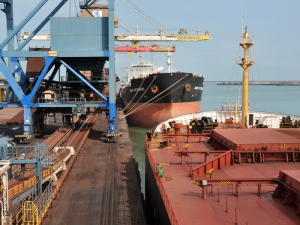


(Posted on 14/01/20)
Despite a reduction in solid bulk volumes last year, Dunkerque-Port's annual traffic reached 53 MT, up 3% from 2018 (51.6 MT).
France's third-ranking port, Dunkerque-Port is well known as a port handling heavy bulk cargoes for its numerous industrial installations.
It has built its reputation in other sectors such as cross-Channel Ro-Ro traffic to Great Britain, containers, fruit, etc. The port is also France's
leading port for ore and coal imports and leading port for copper imports.
Over the past 5 years, growth in traffic has reached 22% (43.50 MT in 2013). In the container sector, the significant increase in
volumes handled at Dunkerque-Port is also in line with the trend observed in recent years (450,000
TEU, + 7% / 2018 & + 54% / 2013).
Solid bulk was down 9% to stand at 23.5 MT. The economic downturn currently affecting the
European steel industry is weighing on the ore and coal traffic which fell by 10% and 19% respectively to
13.3 MT and 5.3 MT. The coal sector is also undergoing the more structural effect of the drop in demand
for steam coal. Boosted by a good start to the 2019/2020 campaign grain trading posted a significant
increase of 43% at 2 MT. Traffic in “small” solid bulk fell 9% (2.9 MT)
Liquid bulk rose very sharply by 71% to 9.4 MT, driven by a very high level of LNG trading. The
new LNG terminal berthed 72 port calls over the full year representing a total traffic of 5.1 MT (+ 320%).
Overall, gas traffic (LNG + industrial gas) posted a gain of 232% at 5.6 MT. Petroleum products were down
2% at 3.34 MT, while other liquid bulk posted growth of 4% to stand at 0.5 MT.
General cargo at the port was stable at 20.1 MT. There was a downturn in Cross-Channel traffic (15 MT) as the
market prepares for Brexit: the number of trucks and trailers decreased by 2% to 583,000 freight units while that
of passenger cars stood at 579,000 vehicles (-16%). Passenger traffic dropped 11% to 2,341,000 travellers. Containers
again posted a record year at 450,000 TEU, up 7%. The increase is due in particular to Dunkerque's positioning as a transhipment hub . Break-bulk cargo posted good figures (1.2 MT, + 9%).
2019 was marked by the commissioning of the extension to the quai de Flandre in the West Port.
The completion of the operation is a major step in the further development of the container sector
in Dunkerque. Dunkerque-Port can now simultaneously berth two of the largest ships in the world
fleet under optimal conditions.
Abu Dhabi based AD Ports Group, a global enabler of integrated trade, transport, industry, and logistics... Read more
This year marks a significant milestone in maritime innovation as Port Hedland, Australia, celebrates... Read more
Associated British Ports (ABP), the UK’s leading port operator, has announced the latest tranche... Read more
During the Investment, Labour, and Trade Promotion Programme in Japan (November 16–22, 2025),... Read more
AD Ports Group subsidiary Khalifa Economic Zones Abu Dhabi - KEZAD Group, the largest operator of integrated... Read more
Abu Dhabi based AD Ports Group, a global enabler of integrated trade, transport, industry, and logistics... Read more
Peel Ports Group has achieved a 48% reduction in operational greenhouse gas emissions in the last five... Read more
The Trois-Rivières Port Authority (TRPA) in Canada has announced the appointment of Mr. Anick... Read more
Euroports commitment to continuously improving operational efficiency, enhancing workplace safety, and... Read more
Under the slogan ‘Your Intermodal Link Between China, Iberia and the Atlantic Markets,’... Read more